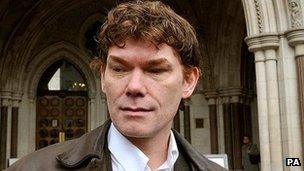Hacker Gary McKinnon will not face UK charges
- Published
- comments

British computer hacker Gary McKinnon fought extradition to the US for years
Computer hacker Gary McKinnon, whose extradition to the US was blocked, will not face charges in the UK, bringing to an end a 10-year legal battle.
Director of Public Prosecutions Keir Starmer QC said the chances of a successful conviction were "not high".
Janis Sharp, Mr McKinnon's mother, said the news was "amazing" and she was grateful the case was "all over now".
Mr McKinnon, 46, admits accessing US government computers but says he was looking for evidence of UFOs.
The US Department of Justice said it would continue to collaborate with the UK government on a "wide range of shared concerns".
Mr Starmer announced the decision not to prosecute some three months after Home Secretary Theresa May stopped Mr McKinnon's extradition.
Low 'conviction prospects'
The US authorities tried to extradite Mr McKinnon to face charges of causing $800,000 (£487,000) worth of damage to military computer systems and he would have faced up to 60 years in prison if convicted.
Gary McKinnon's mother: ''It's been life destroying, it's difficult to explain how bad it's been, and to have this over is amazing''
Mr McKinnon, who had been fighting extradition since 2002, has Asperger's syndrome.
In October, the Briton was permitted to stay in the UK on human rights grounds after medical reports showed he was very likely to try to kill himself if extradited.
In a statement, Mr Starmer said: "The potential difficulties in bringing a case in England and Wales now should not be underestimated, not least the passage of time, the logistics of transferring sensitive evidence prepared for a court in the US to London for trial, the participation of US government witnesses in the trial and the need fully to comply with the duties of disclosure imposed on the CPS.
"The prospects of a conviction against Mr McKinnon which reflects the full extent of his alleged criminality are not high."
He concluded: "Against this background, the joint CPS/police panel recommended to the Assistant Commissioner of the Metropolitan Police that he should not commence a new criminal investigation into Mr McKinnon. The Assistant Commissioner of the Metropolitan Police has accepted that advice."
Following the decision not to bring charges in the UK, Mr McKinnon's mother said: "I'm very pleased and glad Gary's not going to have to go through another long term of trauma.
"I would love more than anything now for Mr Obama to give Gary a Christmas pardon."
She told BBC News: "Gary admitted to the intrusion, he always denied the damage. I feel the 10 years have been gruelling, it's been life-destroying. It's difficult to explain how bad it's been.
"To have this over is amazing. Gary's gone through enough. Other people have been accused of more serious hacking in this country and they've been given a £1,000 fine and a very short community sentence.
"Gary regrets what he's done. He wishes he hadn't done it. He wishes he hadn't upset the Americans. We all regret it. But I'm grateful to Theresa May that this is all over now."
Mr McKinnon's lawyer Karen Todner said she had "mixed feelings" about the decision.
She said: "I am pleased he is not going to be prosecuted because I wouldn't want to think he would ever spend any time in prison given his mental situation.
"But I am disappointed because the extradition warrant is still outstanding because he can't travel anywhere outside of the UK and will have this hanging over him until it's resolved.
"We have discussed approaching president Obama and asking for a pardon."
The US Department of Justice said its "law enforcement relationship between the United States and the United Kingdom has always been predicated on trust, respect, and the common goals of protecting our nations and eliminating safe havens for criminals".
It added: "Notwithstanding the home secretary's decision in the McKinnon case, our extradition treaty serves the interests of both our nations, and the United States values our continuing collaboration with the CPS and British law enforcement authorities on a wide range of shared concerns."
Risk of suicide
US authorities have described Glasgow-born Mr McKinnon's actions as the "biggest military computer hack of all time" that was "calculated to influence and affect the US government by intimidation and coercion".
Mr McKinnon lost appeals in the High Court and the House of Lords against his extradition, but two years ago a High Court judge ruled Mr McKinnon would be at risk of suicide if sent away.
Earlier this year Mrs May put the decision on hold, in order that Home Office appointed psychiatrists could conduct an assessment of Mr McKinnon's mental state.
The psychiatrists concluded Mr McKinnon would be likely to take his own life if he was sent to face trial in the US.
Mr McKinnon was arrested in 2002 and again in 2005 before an order for his extradition was made in July 2006 under the 2003 Extradition Act.
- Published16 October 2012
- Published14 December 2012
- Published14 December 2012
- Published6 September 2012
- Published24 July 2012
- Published19 July 2012
- Published10 April 2012
- Published30 March 2012
- Published15 March 2012
- Published15 March 2012
- Published6 December 2011
- Published18 October 2011